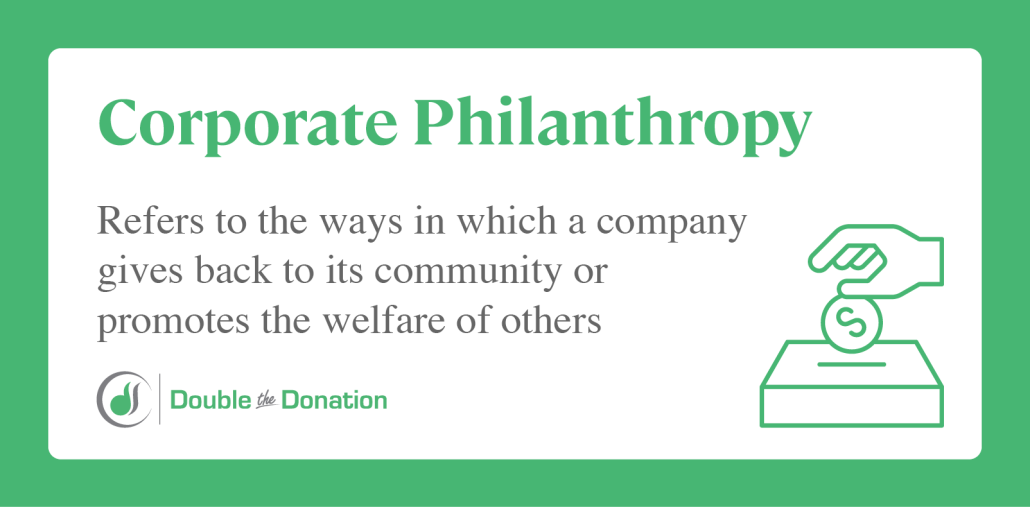The role of corporate philanthropy in shaping public-private partnerships
Why Corporate Philanthropy Issues: A Guide to Business Social Responsibility
Company philanthropy functions as a vital element of corporate social duty. It reflects a business's dedication to social issues and improves its public photo. Services participating in humanitarian initiatives commonly see improved staff member morale and stronger community connections. Nevertheless, truth impact of these efforts can be complex and multifaceted. Comprehending the nuances of business philanthropy can brighten its value in today's company landscape. What are the vital elements that drive its success?
The Meaning of Business Philanthropy
Corporate philanthropy refers to the charitable contributions and initiatives taken on by businesses to support social causes and neighborhood growth. This concept encompasses a variety of activities, including financial donations, worker volunteer programs, and in-kind presents of service or products. Companies engage in philanthropy to address social issues such as education, healthcare, environmental sustainability, and poverty relief.
Normally, company philanthropy is structured with official programs or collaborations with not-for-profit organizations, permitting businesses to leverage their resources effectively. These campaigns commonly aim to make a favorable influence on the area while straightening with the company's worths and goal. Additionally, corporate philanthropy shows a dedication to company social duty, showcasing exactly how services can add to culture past earnings generation. By joining humanitarian efforts, companies can play a significant duty in promoting social change and dealing with community requirements.
Benefits of Business Philanthropy for Companies
Participating in company philanthropy deals countless benefits for businesses, enhancing their reputation and cultivating stronger community connections. Companies that actively take part in kind initiatives often experience enhanced employee spirits and loyalty. When workers view their organization as socially liable, they are more probable to feel happy with their work environment, bring about higher degrees of task fulfillment and retention.
Business philanthropy can create beneficial networking opportunities. Working together with non-profits and area organizations allows companies to attach with similar individuals and teams, possibly resulting in collaborations that can benefit both events. In addition, businesses participated in philanthropy may find themselves extra appealing to investors and stakeholders who prioritize honest techniques.
Inevitably, business philanthropy not only sustains social demands however likewise supplies concrete advantages to organizations, creating a win-win scenario that advertises growth and sustainability while adding favorably to the globe.
Enhancing Brand Name Commitment Via Social Duty
Enhancing brand commitment via social duty entails structure trust with consumers by aligning corporate actions with community worths (corporate philanthropy). Firms can promote much deeper links with community involvement initiatives that resonate with their target market. In addition, authentic brand storytelling can further reinforce loyalty by showcasing authentic commitment to social causes
Structure Trust Through Action
Structure depend on through action is an effective method that business can apply to strengthen brand name loyalty and foster deeper connections with consumers. When businesses proactively involve in corporate philanthropy, they demonstrate a dedication to honest methods and social obligation. This aggressive technique not only boosts their online reputation but also resonates with customers that focus on worths alignment. Transparency in philanthropic initiatives is important; firms need to effectively interact their initiatives and the influence they are making. Authenticity plays a considerable function also; consumers are a lot more likely to sustain brand names that truly care concerning societal issues instead of those that take part in surface advertising and marketing. Eventually, by prioritizing purposeful activities over simple words, business can support long-lasting count on and commitment among their customer base.
Area Interaction Campaigns

Genuine Brand Name Storytelling
Community involvement initiatives often function as a structure for genuine brand name storytelling, which plays a significant role in cultivating brand loyalty. By sharing real stories regarding their social obligation efforts, business can attach mentally with consumers. These tales highlight the brand name's values, goal, and commitment to societal improvement, promoting depend on and relatability. When customers view a brand as socially responsible, they are much more likely to develop a much deeper fondness and choice for it. Authentic storytelling likewise urges openness, inviting customers to involve with the brand name on an individual level. Because of this, businesses not only improve their track record however also construct long lasting relationships with their target market, eventually resulting in boosted loyalty and advocacy in an open market
The Function of Employees in Corporate Philanthropy
Staff members play a crucial function fit a firm's kind efforts via their interaction and participation. Reliable employee interaction strategies can enhance volunteerism, resulting in purposeful neighborhood influence. As organizations harness the cumulative energy and interest of their workforce, they can foster a society of providing that expands beyond the office.
Employee Involvement Approaches
Interaction in corporate philanthropy promotes a feeling of purpose that prolongs past simple profit-making. Firms can enhance staff member involvement by implementing different approaches that encourage engagement in humanitarian campaigns. One effective method is to develop a coordinating present program, where the company matches worker contributions to qualified charities, magnifying their influence. Additionally, routine interaction about humanitarian initiatives can develop awareness and influence staff members to add their time and resources. Providing systems for workers to share their philanthropic passions cultivates a feeling of possession and area. Recognizing and rewarding workers for their philanthropic payments can likewise enhance a culture of giving, eventually causing a much more involved workforce lined up with the business's social responsibility objectives.
Volunteerism and Community Impact
Corporate philanthropy thrives when people proactively join volunteerism, straight affecting the areas they offer. Employee participation in volunteer campaigns not just improves business culture but also cultivates a sense of function and connection among team. Through volunteering, employees create essential abilities, such as team effort and leadership, which can translate right into boosted work efficiency. In addition, when workers unite for area causes, they enhance their bond with the organization, boosting general spirits visit this website and commitment. Organizations that motivate volunteerism frequently see a favorable public picture, as community involvement shows their commitment to social duty. Inevitably, the cumulative effect of employee volunteer initiatives can transform neighborhoods, dealing with pressing social issues while enhancing corporate worths and objective.

Measuring the Impact of CSR Initiatives
As companies significantly buy corporate social responsibility (CSR) initiatives, recognizing their effect becomes crucial for reviewing efficiency and guiding future initiatives. Gauging the influence of CSR needs a multifaceted strategy, integrating both quantitative and qualitative metrics. Key performance indications (KPIs) such as additional reading neighborhood interaction degrees, employee contentment, and environmental renovations give beneficial insights right into the outcomes of CSR programs. Surveys and interviews with stakeholders can reveal the social modification created by these efforts, while information analysis helps track progress against established goals.
Aligning CSR objectives with service purposes enhances responsibility. Organizations can make use of frameworks such as the International Reporting Initiative or the UN Sustainable Advancement Goals to systematize their dimension processes. Eventually, exact assessment of CSR initiatives not only demonstrates a company's commitment to social obligation but likewise informs method changes to take full advantage of favorable influence, fostering a culture of sustainability and community engagement.
Ideal Practices for Executing Reliable CSR Approaches
Implementing effective CSR techniques requires a clear understanding of an organization's values and goals, assuring positioning with stakeholder assumptions. Effective firms start by conducting an extensive analysis of their social, environmental, and financial effects, permitting them to determine locations for improvement. Stakeholder engagement is important; companies must proactively entail employees, clients, and area participants in the growth and execution of CSR efforts.
Transparency is one more finest practice, as it fosters trust and accountability. Business ought to interact their CSR objectives and progression freely, sharing both successes and obstacles. Additionally, integrating CSR into the core organization technique enhances its impact, making it a fundamental component of procedures instead of an afterthought. Regular evaluation and adaptation of CSR efforts, notified by stakeholder responses and altering societal demands, assurance relevance and efficiency. By sticking to these methods, companies can produce lasting and significant CSR strategies that reverberate with their neighborhoods.
Frequently Asked Inquiries
Exactly How Can Tiny Services Participate in Corporate Philanthropy?
Small companies can join company philanthropy by donating a portion of earnings, sponsoring regional occasions, partnering with nonprofits, providing worker volunteer days, and involving in community service webpage activities, fostering a positive effect and boosting their brand reputation.
What Prevail Misconceptions About Business Philanthropy?
Typical false impressions about company philanthropy include the idea that it's exclusively a marketing device, that only large business can take part, and that it does not have authentic influence. Several underestimate the worth local business can contribute with significant interaction.
How Do Customers Perceive Companies Taken Part In Philanthropy?
Customers usually view companies taken part in philanthropy positively, connecting such efforts with corporate responsibility, ethical habits, and community support. This perception can boost brand commitment, influence acquiring decisions, and improve overall business track record in the market.
Are There Tax Advantages for Organizations Associated With Philanthropy?
Organizations entailed in philanthropy commonly take pleasure in numerous tax advantages, such as reductions for charitable payments. corporate philanthropy. These motivations can boost a business's financial standing while advertising a favorable public photo via their neighborhood interaction initiatives
Can Corporate Philanthropy Improve Worker Retention Fees?
Company philanthropy can improve employee retention prices by fostering a feeling of purpose and belonging amongst personnel. Engaged staff members, lined up with business values, are more most likely to remain satisfied and committed within their duties.
Business philanthropy serves as a necessary element of company social obligation. Company philanthropy refers to the charitable contributions and initiatives taken on by companies to sustain social causes and neighborhood development. Furthermore, company philanthropy shows a dedication to business social obligation, showcasing just how businesses can add to culture beyond profit generation. Involving in corporate philanthropy offers many benefits for organizations, improving their online reputation and fostering more powerful area connections. Consumers commonly view business involved in philanthropy positively, linking such efforts with corporate duty, moral habits, and community support.